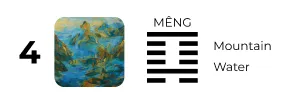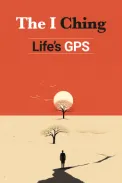I Ching Hexagram 4 MÊNG
Note: This is a summarised version.
For the complete version, visit aiching.app.
Or get the ebook or print edition on Amazon: Embracing Life's Journey Your Guide to Personal Growth with the I Ching.
Click here to read a full example of Hexagram 1 - The Creative that appears in the app and book editions.
What is Hexagram 4?
'Youthful Folly', addresses the challenges of learning, emphasising openness and humility. It describes the relationship between the wise Sage and the learner, highlighting the need for receptiveness and an open mind for wisdom. This hexagram stresses the naturalness of mistakes in learning and the importance of a humble approach to guidance, advocating for inner reflection and a genuine, ego-free journey towards understanding.

I Ching Hexagram 4 - Youthful Folly
Every experience is a learning opportunity. Approach each lesson with an open mind and willingness to learn, even if it means admitting ignorance. The I Ching suggests that wisdom can be attained by humbly following the guidance of the Sage.
Summary
Represents the potential for making mistakes due to inexperience or lack of wisdom. The judgment emphasises that perseverance furthers.
Interpretation
Explains the relationship between the wise Sage and the seeker of guidance. The Sage will only share insights if the seeker is receptive, open-minded, and willing to suspend disbelief. The hexagram acknowledges that mistakes and ignorance are a natural part of the journey and reminds us to approach others with an open mind.
Line 1
Encourages self-discipline and inner reflection. Highlights the need to actively apply our knowledge and learning, not merely rely on being told what to do. Balance between self-discipline and courageous contemplation is vital.
Line 2
Stresses patience and kindness with those less experienced or wise. Promotes leading by example and maintaining a disengaged state of mind. One should cultivate inner strength and calm to effectively guide others.
Line 3
Warns against a servile approach to learning. Encourages letting individuals make mistakes and learn through their experiences. A humble and genuine approach to learning is key.
Line 4
Warns against ego-driven navigation of life. Stresses the importance of letting go of the ego and returning to humility to progress.
Line 5
Promotes a childlike openness of mind in understanding the world. Focus should be on the truth rather than attempting to make ourselves understood.
Line 6
Speaks to punishment and prevention of transgressions. Suggests fate punishes us when we disregard cosmic laws, as a necessary means to rectify our attitudes. It is important not to dwell on the faults and transgressions and to maintain a balanced view of them.
Unveiling the Wisdom of Hexagram 4: A Guide to Personal Transformation
Dive into the ancient teachings of I Ching Hexagram 4, known as Youthful Folly or Meng, as we uncover its profound wisdom for self-improvement, personal growth, enlightenment, and awakening. This guide is a practical journey into integrating timeless truths into our contemporary lives, fostering deep personal transformation and a richer understanding of our personal journeys.
Core Insights
Essence of Hexagram 4
Hexagram 4, Youthful Folly, represents the theme of learning and the spirit of inquisitiveness. It embodies the journey of acquiring wisdom through the acknowledgment of one's own ignorance and the openness to being taught.
Historical Wisdom
This hexagram has historically been seen as guidance for those in the process of learning and development, emphasising the importance of humility, the willingness to learn, and the value of seeking knowledge from wise mentors.
Personal Growth and Self-Improvement
Reflective Questions
- What areas of my life currently reflect the spirit of 'Youthful Folly,' where I need to embrace learning and growth?
- How can I cultivate humility and openness to new experiences and knowledge?
- In what ways can I actively seek out mentors or sources of wisdom in my journey?
Actionable Insights
- Identify new skills or knowledge areas to explore that align with your personal or professional growth goals.
- Approach challenges and unknowns with curiosity, seeing them as opportunities to learn rather than obstacles.
- Create a learning plan that includes seeking out mentors, courses, or books that can guide you in your desired growth areas.
Path to Enlightenment
Mindfulness Practices
Engage in mindfulness practices that encourage a beginner's mind, allowing you to see the world with fresh eyes and a keen sense of discovery.
Philosophical Reflections
Reflect on the role of continuous learning and humility in the journey towards enlightenment, considering how 'Youthful Folly' can be a state of openness and growth rather than naivety.
Awakening to Life’s Mysteries
Transformational Stories
Share or seek out stories that highlight the transformative journey from ignorance to wisdom, showcasing how the lessons of 'Youthful Folly' have led to personal growth, enlightenment, and a deeper understanding of life's mysteries.
By exploring the wisdom of Hexagram 4, we embrace the path of lifelong learning and curiosity, recognising that every experience holds the potential for growth, enlightenment, and a deeper connection with the world around us.
More Information about the I Ching
Understanding the Structure of Hexagrams
Every hexagram in the I Ching, from the first hexagram to the 64th, is constructed using a combination of trigrams. These trigrams, the building blocks of every I Ching hexagram, represent different natural elements and concepts, such as wind, water, fire, and mountain. The upper trigram and lower trigram interact, giving birth to the unique energy of the hexagram. By delving into the trigrams that compose a hexagram, one can unearth its deeper meanings and implications.
The Timeless Nature of I Ching
The I Ching, often referred to as the Book of Changes or Yijing, has remained relevant due to its universal themes. While society has evolved, the essential human emotions and challenges we face remain. The 64 hexagrams of the I Ching address these timeless concerns, making it an untiring guide for introspection and growth. Whether you're contemplating the creative power of Hexagram 1 or the dynamic interplay in other hexagrams, the wisdom remains ceaseless.
The Philosophical Foundations of I Ching
The I Ching is deeply rooted in Taoist and Confucian philosophies. It's a reflection of the world's natural order, emphasising the dynamics of yin and yang. Studying the hexagrams provides insights into the ancient Chinese understanding of balance, change, and harmony in the universe.
How to Consult the I Ching
Traditionally, seekers would consult the I Ching using yarrow stalks or coins. The divinatory process, often seen as an interaction with the oracle, results in a specific hexagram. This hexagram, whether it be the light-giving Hexagram 1 or another, provides guidance tailored to the individual's query. Modern enthusiasts might also opt for a free I Ching reading online to understand their current situation better.
Incorporating I Ching Hexagram 4 into Daily Life
Hexagram 4, often referred to as the symbol of youthful inexperience or the naive youth, provides insights that resonate deeply with our daily journey of learning and growth. The six lines of this hexagram encourage us to approach life with a beginner's mind, embracing every opportunity to learn, even from our mistakes. By embodying the teachings of this hexagram, we are reminded of the importance of seeking guidance when needed and the value of humility. It's about understanding that every phase of ignorance is a phase of potential growth. As we navigate our daily challenges, Hexagram 4 guides us to remain open, curious, and eager to evolve, ensuring our actions and decisions are informed by both innocence and wisdom.
Incorporating I Ching into Self-Improvement and Personal Growth
The I Ching, with its intricate tapestry of hexagrams, serves as a profound compass for those on a journey of self-improvement and personal growth. Each hexagram offers insights into life's challenges and opportunities, guiding individuals to introspect, evolve, and align with the universe's natural rhythms.
Regularly consulting the I Ching offers a bridge to ancient wisdom, helping seekers tap into their inner strengths and potentials. The detailed interpretations of each hexagram, from the dynamics of its yang and yin lines to its overarching message, act as roadmaps for personal development. They shed light on one's strengths, highlight areas for growth, and provide direction in times of uncertainty.
For those dedicated to personal evolution, the I Ching is an invaluable guide. It aids in discerning the optimal paths in life, understanding relationship dynamics, and fostering a harmonious balance in all endeavours. Through its teachings, individuals are equipped to cultivate essential virtues like patience, resilience, and empathy. This not only empowers personal growth but also enables one to be a positive force in the broader world.
In today's rapidly changing world, the I Ching remains a pillar of timeless wisdom. It beckons individuals to journey inward, embrace continuous learning, and cherish the ever-evolving process of self-betterment.
Consult I Ching
Choose a Hexagram Number
How to use the coin method to consult the I Ching
Consult the I Ching online. Use our coin method simulation and build your own hexagram.
Useful Links
- Revolutionary I Ching App Harness ChatGPT for Hexagram Insights, Download AI Ching App
- What is the I Ching
- How to consult the I Ching
- Consult the I Ching Online
- Discover the ‘Daily I Ching’ for universal guidance.
- Access all the I Ching Hexagrams 1 to 64
- Buy the book, Embracing Life’s Journey Your Guide to Personal Growth with the I Ching
- Little Panda Learns the Tao: Stories of Nature’s Balance. Download on Amazon
FREE Ebook - The I Ching: Life’s GPS

The Ultimate Guide to Life's Answers
Enter your Email & Get Yours for FREE!

